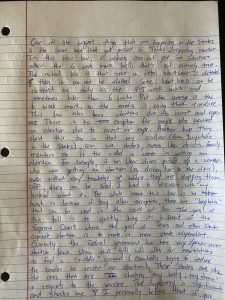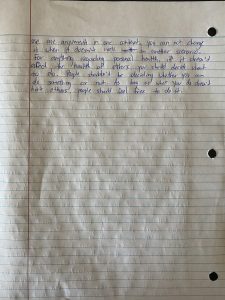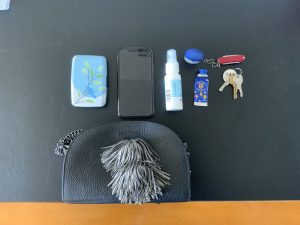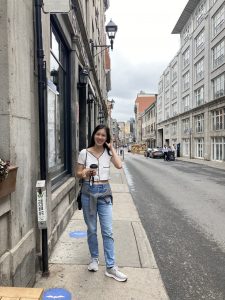Task 3: September 21st, 2021
Transcript:
Hey it’s either funny story to tell you this will happen when I was in grade 6 and at this point I went to China with my family so my brother and sister mom and dad and we went to a circus to watch the show So what happened was shortly before the show started my sister had to go to the washroom so at this point I am in grade 6 right so I’m about 1213 years old and my sister at this time since we’re ten years apart she was two or three years old and so I carried my sister to the washroom and then apparently this is what my brother and mom told me when we got back from the washroom so mind you we all speak Mandarin right but because me my brother and sister look I guess white they they assumed that we wouldn’t understand them so when I came back my brother my mom told me this story ascentia Lee when I got up to take my sister to the washroom was like 2 ladies behind us and then apparently they were talking to John they were like oh look at that mom taking her daughter to the washroom ‘cause I guess they were just curious because seeing like white people there and funny thing happened my brother he turned around and he was like no that’s not my no that’s not her mom that’s my sisters and then apparently the two ladies in the back were pretty shocked and not so yeah my mom told me that story afterwards so yeah I notice this happens quite a bit when I every time I go back to China that the age difference between me and my sister because it’s pretty large especially when we were younger I looked more mature for my age so I would get a lot of comments about oh is that your daughter with you when they were referring to my sister and I always have to correct them no that’s my sister not my not my daughter there’s also another incident where this is when I was in grade 10 and then my sister at this time would have been in kindergarten and was picking her up from from kindergarten when were in China for the summer again and the teacher she looked issue she saw me and she was like oh your mom is here and then I had to look I had to look at the teacher had to tell her again no I’m the sister I’m not the mom and the teacher looked horrified but my sister she decided to play into the I guess like the joke in that it was like Oh yeah my mom’s here she thought it was funny I was not too impressed considering I was only in grade 10 and yeah There was also other incidences were I would take my sister out for like lunch or whatever every time we were in China and that and there will always be some type of comment or whatever all your daughter is so cute how old is she and my sister just look at me and I have to always feel like no that’s my that’s my that’s my sister not my daughter and then the people would be like oh how old are you then then I’ll tell them like you know I I’m 16 not not in my 20s or 30s and then the first one always be horrified in love and yeah and then they’ll be like oh that how old is your sister and then I would go into the whole spiel about how like where we’re from like how did I learn Mandarin what am I doing in China right now and yeah they usually are interested in background story and they’re impressed when I guess someone who is white looking or white passing speaks Mandarin and lot yeah Yeah then also there is quite a few incidences where people would ask like if like I clear was real because like they haven’t seen someone with like hazely green eyes and then since my sister which was younger had curly hair people would ask if that was real as well because it’s kind of rare to see people with curly hair at that time Oh yeah and I also remember a story where this was back I think in the 80s or 90s when my dad went to China for work in that and he went to a Barber shop at that time to get his haircut with my mom and what happened was this was the first time they’ve ever like seen like a foreigner a white guy in that an at that time my dad had grayish brownish hair but The thing is a changed colour when it got wet right so it went from like a lighter colour too it’s only a very dark colour when it got wet and people were so shocked about that that they had random strangers kind of like all around my dad just looking at how his hair colour changed and I think that’s funny how like so many things have changed from now even to so China has opened their borders there’s more and more foreigners which which is which is nice to see and also in the bigger cities people aren’t as shocked when they see foreigners but times when I visited smaller villages in that and different places where there’s like no foreigners or very little you definitely get looked at a lot more just because they’re not used to seeing people with different features and lot
__________________________________________________________________
The text deviated quite a bit from the conventions of written English. I use Microsoft Word voice over in order to record my anecdote. In written English, there is a lot grammar rules that needs to be followed, such as quotations for quoting what someone else or you say, question marks, periods, spacing between quotes, and commas.
In the text, there are many grammar errors. Firstly, there is absolutely no periods anywhere to indicate the end of a sentence. Secondly, there are also no commas for when I am listing things that happened. Thirdly, when I am quoting what my brother and mom said, there are no quotations at all. When I had a rhetorical question in there, there was no question marks. There are also some words in the text that I did not say or are missing. The addition or omission of certain words makes the sentence incorrect. The one thing that the text got right was the spelling of “colour” (per Canadian English) instead of American English. However, in Microsoft Word, they still have the word underlined in red (I know I can add it to the dictionary list, which I did later). It also got most of the sentences and words correctly, but the missing punctuations make it hard to read and follow along.
The most common mistakes in the text is the lack of punctuation. These are mistakes because the rules in written English are strict in regards to how text should be written. The organization of text, grammar, and punctuation are followed in written English to make it easier to read and determine what is going on. Based on the rules we were taught in school, the text above deviates greatly from what we learned. Breaking these rules in English would count as a “mistake.” When I was in elementary and high school, grammar and punctuation were things that we got marked on. If there was an error, we would get comments or marks deducted from our work. The way the system works tells students that this is a mistake and must be fixed.
If I were using Microsoft Word voice over with a scripted story, there would be less errors in terms of omission or addition of words. I believe the pauses and also the fumbling of words while I was recording my anecdote created errors in the text. If it were scripted, I would not have pauses or fumbling of words. This can decrease the amount of “errors” I would make. Also, my pronunciation of words from my mind may differ than if I were to read something directly. In terms of grammar and punctuation, based off the tool I used, I do not think it would differ much. It appears that Microsoft Word does not add the punctuation automatically. Instead, if I said a sentence (eg. I like bubble tea.), I would need to say “I like bubble tea period” in order to have a period at the end of my sentence. The tool also doesn’t seem to allow for direct quotation marks.
Oral story differs greatly from written storytelling. In oral stories, we use our voice, the volume, and tone to show our emotions and convey meaning. In this weeks module, while listening to and reading Julias Caesars, the way the actors said the lines sometimes differed from the punctuations and tone indicated in the written text. At one line (“Oh judgment!”), there was an exclamation mark, however, the actor did not raise his voice. Instead, he had a more solemn, low, and quiet voice, which is not portrayed by the punctuation in the text. Furthermore, written story telling does not demonstrate the potential dialects that exist when something is spoken in a dialect. Ong (2002) mentions that “of the some 3000 languages spoken that exist today, only some 78 have a literature” (p. 7). This quote made me think about Shanghainese, a dialect spoken in Shanghai. The only way to know how to pronounce the words is through oral language. There is no “written text” to show that “this is how you pronounce it.” All the written words used is Chinese (Mandarin). I remember hearing that Shanghainese was beginning to die out in the mid to late 2000’s. Due to this, schools in Shanghai began teaching the Shanghainese dialect in order to preserve it. Furthermore, in written storytelling, we can “see and touch such inscribed ‘words’ in texts and books” (Ong, 2002, p. 11). For oral storytelling, there is not such thing. In terms of my grandparents and mom speaking to me in Shanghainese, instead of thinking about the words (eg. the character since I know very little written language in Mandarin), I rely on having an image of some sort in my head.
Overall, I find this interesting that there is such a key difference between oral storytelling and written storytelling. My biggest takeaway from this weeks module was that written language is based on oral language. However, oral language is what we use to truly tell stories with emotions and convey meaning.
References
Ong, Walter, J. Taylor & Francis eBooks – CRKN, & CRKN MiL Collection. (2002). Orality and literacy: The technologizing of the word. New York; London: Routledge.




